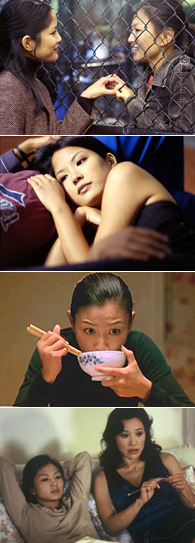It is never fun to be the sandwich filling in any triangular situation. This is a key moment in Alice Wu's rave debut film, Saving Face. It is a meet THE mother scene.

From left: Michelle Krusiec, Lynn Chen and director Alice Wu on the set. Saving Face, the first American theatrical release featuring an Asian American lesbian couple, will be released on DVD on October 18, 2005
Scarily caught between is Wil, as mom and girlfriend try to get to know each other. On every Chinese parent's mind are questions such as, how emotionally important is this person to my kid, and what does said person do. So, when it transpires at the dinner table that Vivian is a dancer, Chen's clipped responses are priceless for the classy actor she is and priceless for the hilarity we felt in the safety of the theatre's seats - a safety not shared by an increasingly stressed out Wil, very concerned that mom will soon find out that best friend is also one's hotter-than-hell lover. And no offspring, particularly an uptight doctor type as was Krusiec's role, wants their mom to imagine even the slightest detail of their erotic lives. Wil's high anxiety is mostly conveyed through eye movements and a continuous shovelling of rice into her gullet. The tension almost snapped her chopsticks. This is emblematic of Wu's attentiveness to the more than surface textures of life in her film, and to her ability to direct her actors, and the camera.
Saving Face is a well-edited story that flows well, so well that you need to sit back to begin to understand how Wu put it all together.
It's culturally very empowering to see two talented and highly-educated Chinese lesbian characters engaged in a love pas de deux that's as 'normal' as they come. (This is not to say that the lovers do not face challenges, they do). Indeed normal is not a usual word to use to refer to queer women film, or literary, characters. However the normalising of lesbian love between Chinese American characters suits the film, and is among the significant inclusionary gestures that would be valid both in the lesbian cultural corpus and the mainstream cultural oeuvre. After all, outside of burlesque and Halloween, no one wants to be treated as grotesque. Yes, we use our digits and use them well but most of us come with the normalised ten digits, queer or not. As the film says adroitly, we Chinese lesbians can conjugate Latin verbs when we want to but that's not the only conjugation you ought to presume of us.

From top: Girlfriends Vivian Shing (played by Lynn Chen) and Wil (Michelle Krusiec), Chen, Krusiec displays her anxiety by continuously eating as her mom (Joan Chen) and girlfriend try to get to know each other at dinner, mother (Joan Chen) and daughter (Krusiec).
An overarching male figure in the film is Wil's maternal grandpa. For much of the film, he is too rigidified by too literal interpretations of patriarchal teachings. With himself at the top of the hierarchy, he does not feel its oppressiveness until he himself becomes vulnerable at the end. Meanwhile his mature daughter, who's 48 already, suffers throughout the film for his unthinking complicity with the narrowest definition of 'saving face,' so narrow that it shows up as the grossly life-hollowing parody that it actually is.
There is much to enjoy in Wu's Saving Face. Not least because the younger actors are convincing dramatic actors and the older cast led by Joan Chen are sources of first-rate thespian delights: for instance the scene at the hospital where Chen wordlessly shows the build-up of sorrow. That scene lasts not more than 60 seconds yet Chen said so much in that one frame.
People are fond of forming and joining book discussion clubs these days. Why not film discussion clubs? Begin with Saving Face, I say; a well-made, user-friendly film that stays honest. Okay, in the limited duration of a film, it did tie up the loose ends perhaps a bit too readily. However, why not believe, and act from that belief, that anything positive is possible in any moment, in any given situation, no matter how ossified the behaviour seems?
One of the highest compliments Wu's film has received is that here in Vancouver, BC, I do know of at least one queer woman who has watched the film nine times on the big screen, and she promises herself that she will watch the DVD at least 15 times when that's released in October. This is the same friend who helped me spot a very brief cameo appearance in the film by Alice Wu herself. It's not like the Alfred Hitchcock cameos nor will you see a potbellied outline. I shouldn't give you any clues but watch for something a little bit red, a little bit black, and a little bit fast.
Sook C. Kong reads endlessly, loves fearlessly (okay, working on it), watches films of course, and does own a TV so she can watch even more films. Born to Cantonese and Hakka parents, she grew up in Malaysia and Singapore, and lives and works in Vancouver, BC, Canada. She now thinks that she was a lesbian even in previous lifetimes. Her poems and stories have been published in Canada and the US.











 Printable Version
Printable Version










Reader's Comments
Be the first to leave a comment on this page!
Please log in to use this feature.